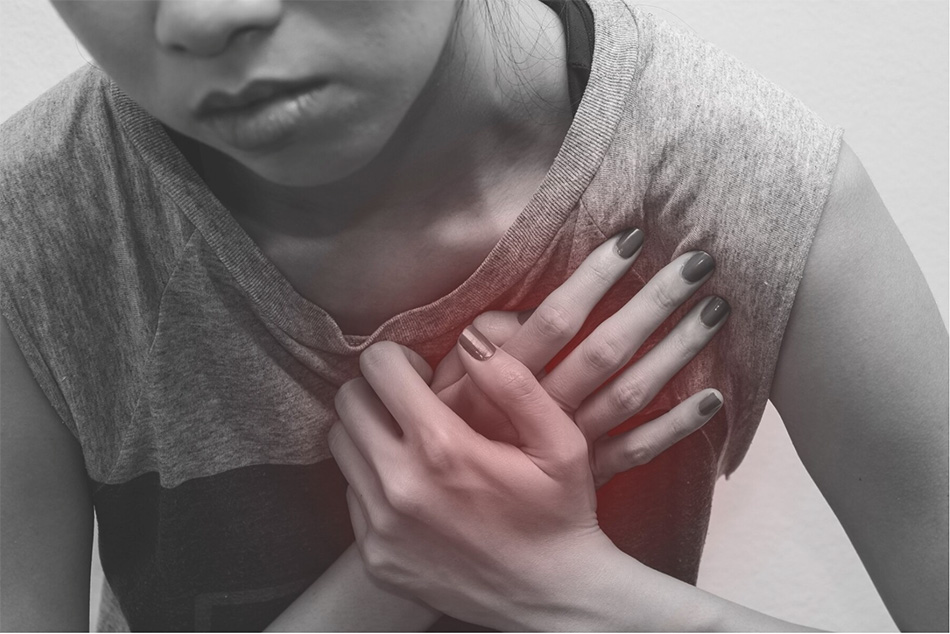Patients experiencing sudden chest pain or severe abdominal pain requiring hospitalisation and treatment are surprised when doctors identify the underlying cause of their illness as anxiety disorder.
Anxiety disorders often manifest under symptoms related to cardiovascular or gastrointestinal issues… However, many people only focus on treating the symptoms, failing to recognise that they’re caused by mental health issues.
Severe abdominal pain due to excessive anxiety
At a follow-up appointment for upper abdominal pain at the Gastroenterology & Hepatology Department of FV Hospital, Ms NTH (30 years old, District 7, Ho Chi Minh City) was writhing in pain in the waiting room chair. However, after conducting tests, Dr Vu Duy Hien found nothing significantly abnormal in Ms H’s digestive system, both this time and previously. Suspecting that the cause of the illness originated from anxiety disorder, he advised Ms H to seek further examination from the Clinical Psychology & Psychiatry department. However, Ms H. immediately refused, believing she had no psychological issues.
Two weeks later, Ms H. returned for another check-up still experiencing severe abdominal pain. The examination results, like the two previous times, showed no serious damage to the digestive system. Dr Hien decided to spend time analysing the situation for Ms H. to confirm that anxiety and psychological pressure were among the causes of the digestive disorder. After more than 30 minutes of conversation with the doctor, Ms H. agreed to undergo a psychiatric health check at the Psychiatry Unit of the Internal Medicine Department at FV Hospital.
The examination results showed that Ms. H had generalized anxiety disorder, affecting her digestive system and sleep. She was prescribed medication to treat the anxiety disorder. Shortly after, she experienced better sleep and her upper abdominal pain gradually improved and eventually disappeared.

Anxiety disorder can lead to gastrointestinal issues.
FV’s Gastroenterology and Hepatology Department has encountered many patients with anxiety disorders manifesting as symptoms like digestive disorders, changes in appetite, and weight gain or loss. Irritable bowel syndrome caused by anxiety disorders is quite common: about three out of 10 cases of irritable bowel syndrome are rooted in anxiety disorders.
However, most of these patients do not believe they have mental health issues. Refusing treatment for the underlying cause of the disease will lead to recurrence and worsening of the condition.
Broken Heart Syndrome due to excessive stress
Anxiety disorders also have a negative impact on the cardiovascular system. Dr Hoang Quang Minh, Cardiology Department, FV Hospital, stated that FV Hospital recently has received many patients coming for examinations with symptoms of palpitations, chest pain, and shortness of breath, but when undergoing ECG and echocardiography to check their heart valves, cardiac muscle, and heart function, the results are normal. In these cases, cardiologists will advise patients to have additional examinations in the Internal Medicine and Psychiatry departments. Often, diagnostics show that they suffer from excessive anxiety affecting the cardiovascular system.
“In fact, the origins of chest pain and shortness of breath may be due to anxiety disorders. Anxiety disorders can manifest in any organ in the body, but the heart is the most easily recognisable place for symptoms to occur. When anxious, the body will stimulate the endocrine system and cause changes in heart dynamics,” Dr Minh added.
If anxiety disorders are not controlled, they can escalate into acute heart failure. Dr Minh mentioned a recent case of a young female patient who came for an examination with symptoms of fatigue and chest pain. The patient was brought to the emergency department by her family because the fatigue occurred continuously and became more severe over time. Test results showed elevated cardiac enzymes, indicating actual heart damage. Without timely treatment, the patient could have suffered cardiac arrest and died.
Dr Minh says that Takotsubo syndrome, a rare condition also known as “broken heart syndrome,” occurs when patients experience emotional stress or excessive psychological pressure that can cause heart damage and lead to acute heart failure.

Anxiety disorders can lead to chest pain, rapid heartbeat.
Anxiety disorders need to be recognised and controlled as early as possible.
Anxiety disorder is a form of emotional stress, with varying degrees and types such as generalised anxiety disorder, social anxiety disorder, and panic disorder. The common characteristic of these anxiety disorders is an irrational worry disproportionate to the situation, causing patients to experience physical symptoms or adverse effects on their mental, social, and occupational functioning.
According to Dr Dao Thi Thu Huong, Psychiatry Department, FV Hospital, individuals with anxiety disorders often have problems with sleeping, finding it difficult to fall asleep due to their persistent and uncontrollable thoughts. They experience difficulty concentrating, are prone to headaches, tension, irritability, palpitations, sweating, abdominal pain, neck and shoulder pain, diarrhoea, and constipation. Particularly with panic disorder, patients may feel as if they are about to die, lose control of their bodies, and require immediate emergency care.

Dr Dao Thi Thu Huong, Psychiatry Department, FV Hospital, advises a patient.
Because people do not recognise their anxiety disorder and often deny their mental health issues, many patients visit multiple doctors in different specialties and even visit different hospitals, which requires a lot of time and money. This significantly affects their quality of life and work.
If anxiety disorders are not controlled when they appear, they can greatly impact the health of patients with underlying conditions. “Mental health disorders affect physical conditions, and vice versa, for example, diabetes, hypertension, asthma, or other endocrine diseases. When under prolonged stress, chronic conditions are not well controlled, leading to the need for frequent medication adjustments and other consequences of these diseases,” Dr Thu Huong explained.
Treatment for anxiety disorders can involve a combination of medication and psychotherapy.
At FV Hospital, patients suspected of having anxiety disorders are referred to the Psychiatry – Internal Medicine department for psychological or psychiatric assessment. Patients undergo comprehensive evaluations to accurately diagnose the condition in the shortest possible time. Clinical psychologist Bui Thi Quynh Anh from the Clinical Psychology Department at FV Hospital shared: “Treatment for anxiety disorders at FV Hospital is tailored to each case, and it may involve medication, psychotherapy, or a combination of both.”

Psychologist Bui Thi Quynh Anh, Clinical Psychology Department, FV Hospital, stated that anxiety disorders can be treated with medication, psychotherapy, or a combination of both.
Anxiety disorders require long-term treatment, so encouragement is needed not only from the patient themselves but also from their family and doctors. Additionally, since mental disorders are often influenced by social factors, it is important to consider whether individuals are experiencing any stressors that may require immediate psychological support, combined with various other methods. Currently, there are some new approaches applied at FV Hospital in the treatment of mental disorders if medication or psychotherapy proves ineffective, such as transcranial stimulation.
Please contact the Clinical Psychology Department at FV Hospital for consultation regarding anxiety disorders at: (028) 35 11 33 33.
Due to the pressures of modern life, anxiety disorders are on the rise. According to a survey published in 2021, about four per cent of the population suffers from anxiety disorders, equivalent to 301 million people.
According to statistics from the Ministry of Health released in August 2023, nearly 15 million people in Vietnam suffer from various mental disorders each year, with depression and anxiety disorders topping the list, accounting for 5.4 per cent of the population.



